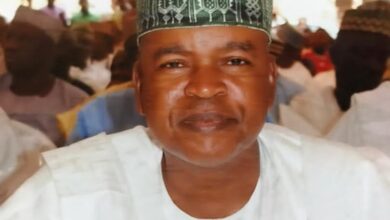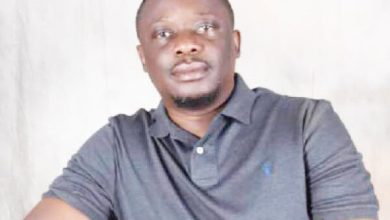Why Nigeria’s main psychiatric hospital gravely lacks sufficient doctors – Bodunwa

In this interview with, the General Secretary of the Association of Resident Doctors at the Federal Neuro-Psychiatric Hospital, Yaba, Folorunsho Bodunwa, talks about the recent strike embarked upon by the doctors, their grievances with the hospital management, and the heavy workload on the resident doctors. Excerpts.
What are the grievances of the association with the management board?
The grievances of the resident doctors with the management board are in two parts: one, is the current state we are right now. The fact that there is a dearth of resident doctors in the hospital, we are understaffed. For example, when I resumed in 2014, the total number of resident doctors was about 56 but currently, we are about 33 and that is about almost 50 per cent reduction. And yet, during this period, the patient load has increased, the workload too has increased. The hospital is building more wards, more units, to cater for the increasing number of patients. Even as at Wednesday (last week), the hospital still opened an annexe in Badore where they will be taking care of child and adolescent cases but the staff to take care of this is decreasing. That is the number one grievance.
Two is also related to it. The hospital management doesn’t have a policy in place for annual recruitment of resident doctors. If this had been instituted, we won’t be having this problem and conversation in the first place. For example, Igbobi recruits resident doctors twice every year so they usually do not run into problems of dearth of resident doctors. The residency training programme is a structured programme in which the resident doctor has a limited number of years to spend in the system. It’s like a training, it is not a full-time employment in which you will be there till you retire. What this means is that a resident doctor will spend about six years in the training and after six years you are expected to have finished your training and you leave to become a consultant.
This means that at some particular point in time, people will be leaving and when resident doctors are employed, they are usually employed in groups, so you can have like 15 resident doctors coming in at once. So it means about 15 will be leaving at the same time. So there should be a plan in place that envisaged that at this particular time, so and so will leave and it will cause serious problems if they are not replaced. So you have employment every year. Since I resumed, about three sets have exited and only one employment has been done since that time.
So you are saying that in the last five years, there has been only one recruitment exercise despite the fact that three batches have exited the system?
Exactly. That is why we have a shortage of personnel.
You are essentially saying that one of the biggest psychiatric hospitals in Nigeria does not have an employment policy that works?
Yes, that’s the exact problem. It is not a problem that is just starting. No policy that says that once a set is exiting the system, another should be inaugurated into the system. Sometimes it takes one year or two. Sometimes new ones will not replace until about three sets have left and we start fighting and struggling for replacement. When these new sets come in, they are usually not in teams of 30’s or 40’s, maybe 15 personnel maximum. My set that resumed in 2014 was the last set in a long time in which we were 23 in the set and I got information that even before we came on board, it was a serious battle.
So when you resumed, the total personnel at the hospital, inclusive of your set, was about 56?
It was plus my set that now made it 56. When we resumed there were about 33 resident doctors left. My set that eventually resumed was 23, putting the total number of resident doctors then at 56.
It means, currently, resident doctors whose residency is older than those in your set are less than 10?
Yes. Our set is the largest number of resident doctors available in the hospital and we should be leaving the system late 2020 or early 2021. This means that if massive recruitment of resident doctors doesn’t happen soon, there will be fewer resident doctors left in the system and fewer ones with long enough residency years and experience to put the new intakes through.
But what’s the management saying in all these?
Well, the management’s explanation is that they cannot just employ without government approval. They need government approval to employ, employment is a long process that goes through about five to six steps. From the permanent secretary to the federal character to federal service commission, and each of these steps, you can’t estimate how long it will take. For example, the management said they applied for a new set of doctors around February this year but even their letter got lost in one of the steps and they couldn’t even find the letter requesting for doctors so they just recently started the process again. Which means we don’t even have a timeline for when we are expecting new resident doctors.
This is not the first time. Sometimes, we will be on the issue of requesting for medical doctors for over a year before we will see, and I need to point out that there is a tradition that before every major employment takes place, there must be strike actions and it’s been going on for years. We were told that before we came in that 2014, it was as a result of strike action.
Probably we can’t fully blame the management, but their fault is that they do not put prospective plans in place. They probably wait until they need. If you envisage that the process takes time, you start way ahead of time. I guess it’s a general Nigerian problem in which there is no plan in place to getting people. You have doctors around looking for residency placement. A lot of people want to specialise in psychiatry but no placement. We talk about brain drain, people graduate, finish NYSC and want to specialize but there are no placements so they end up writing foreign exams and leave. So if you are looking for placement for residency training for five-six months and you can’t get a place and it’s your dream to specialize, you leave.
You said your demands are in two areas, what is the other one?
We want the hospital to institute a schedule for yearly employment. We don’t want to be going on strike every year over this same issue. Let’s just have a plan in place that Yaba will be employing doctors annually or even twice a year if possible because there are times when resident doctors leave in sets twice a year.
Now that the management has said it really is no fault of theirs, is the association planning on meeting with all stakeholders involved in the recruitment process to work out a solution?
That is what we are doing as much as we can. Telling it to the media. We don’t have direct access to Abuja, we are resident doctors and that really should not be our business so we are using the media to inform the presidency that this is what is happening. The truth is, we didn’t just wake up one morning to go on strike, we have been giving ultimatums. 10 days, 21 days, we have been writing letters for close to a year now and we decided that the issue has come to a head and it affects our patients.
What has been the effect of these issues on patients and resident doctors?
It is obvious. The reason we decided to embark on the strike action was because we realized our patients weren’t getting the best even when we were working full time. To put it into perspective, Yaba is a 500-bedded hospital to cater for inpatients and at each particular time, those 500 beds are filled almost always. Relatives are coming to queue that once a bed is empty, their relative is next in line for a bed so the beds are still not enough for inpatient demands. So let’s say you have 450 inpatients you are taking care of, add the fact that we hold clinics for outpatients and on the average we see about 200 outpatients a day and we still have the emergency section where you have on the average about 20 new patients per day. We also have a child and adolescent section which is also Yaba Psychiatry but in a different building and we see new patients there too. You have patients in the adult section there too.
By the time you divide these 33-35 resident doctors into these various sections, it’s a lot of patient load. Although we have consultants, about 23, but the consultants basically supervise us, so, the resident doctors are essentially the workhorse. They are the ones that are always on ground, they are supposed to see the patients, then run their diagnosis by the consultant and the consultant gives a further opinion because they are more knowledgeable and experienced in the field. But because of the large number of patients, a lot of instances, the ball stops at the resident doctor’s table, especially the senior residents.
Essentially, for the clinic, if you have about 200, about 3-4 resident doctors run a clinic, so each would see about 40-50 patients within seven hours. So by the time you have seen 20, you are already fatigued, and you know psychiatry is peculiar, and you need to spend more time with your patient because your patient has a lot to say. On average you should spend 30mins-1hour with your patient, but imagine seeing 50 within seven hours, how do you run proper diagnosis? And this is minus inpatients. In a ward, you can have between 30-40 patients and only two resident doctors. At the end of the day, you are unable to give the best care to your patients and we felt this cannot and should not be allowed to continue.
We know the currency of the medical world is constant research, seminars, skill upgrading, learning new ways and methods. How do the doctors keep up with all these with the current workload in the hospital?
Well, as I said earlier, the residency programme is a training programme. You are writing exams, you are both schooling and working. Don’t forget that the aim of the programme is to become a consultant eventually. If you do not pass your exams within your limited amount of time, you are thrown away and you have to go and look for what to do if you do not become a consultant at the end of the day. So you have to read, try to pass your exams, go for your update courses within this time. You are expected to combine this with your academic work, of course, the academics suffer. When you have done this amount of work in a day, you get to your room and you sleep. Before we started this strike, our doctors were repeatedly falling sick and had to take sick calls from the clinic because of the stress.
As a doctor taking sick leave, you feel a lot of guilt in doing that because you think of your patients and the already overworked colleagues you are leaving behind. Most times we want to cope by all means but it was telling on us. The effect of lack of sufficient personnel on both the patients and doctors and the effect on the population at-large is the reason we had to embark on the strike.
We know the increasing rate of mental illness in our society. There was a time it was all about suicide and all, the estimate is that about 90 per cent of people that commit suicide have one form of mental illness or the other. It implies that those people, many of them would have had some form of mental illness symptom that was missed, not diagnosed or not treated. I’m not saying they didn’t come to Yaba or that they came and were turned back. But apart from the hospital work, we have a lot of work to do in the community, but is it when you are not even done with the hospital work that you will now have time for community work, outreaches and educating the public?
So, we are calling on the government and the management, because we believe that the management should put pressure on the government because Igbobi (Orthopaedic hospital) does something better. It is not a fight against the management but it’s to tell them to put pressure on the government to do the needful.
This interview was conducted before the resident doctors at the Federal Neuro-Psychiatric, Yaba, called off their strike last Wednesday.
Culled from Ptrmiumtimes.com





